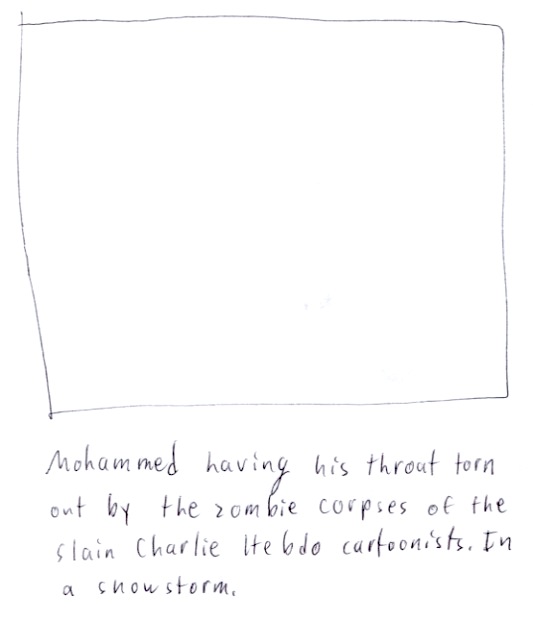The complete roundtable on Satire and Charlie Hebdo is here.
_______
The terror assault which killed twelve people, including many prominent cartoonists, at the offices of Charlie Hebdo occurred two weeks ago now. It has been largely replaced in the news, at least in the Anglophone press, by other atrocities and other controversies. The news cycle is brief and vicious, and old blood, no matter its quantity, soon gives way to new.
Still, the response to the tragedy has at least some lasting lessons for the comics community in general, and for comics scholars in particular. I’d point particularly to a piece by Mark McKinney, a professor at Miami University and co-editor of European Comics Art.
McKinney, in a clearly heartfelt piece, denounced those who responded to the cartoons without sufficient context or understanding. “[W]hen many analysts see the cartoons, they simply lack the artistic, cultural and linguistic frameworks for interpreting them,”he says. He then goes on to argue that the magazine was anti-racist, and to point out that it is a determinedly French, and “even Parisian” magazine. He discusses, in laudatory terms, its commitment to scandalous and offensive imagery. And then, after several paragraphs of general background, he presents his rich, contextualized conclusion.
Through their cartoons, comics and news articles, the journalists of Charlie Hebdo courageously carved out and defended a space for dissent from religious extremism and censorship. Their joyful mockery of religious dogmatism is viewed as insensitive at best, and even blasphemy, by some clerics and their followers, and, as we now know, by terrorist murderers.
The nuanced, scholarly conclusion is, in other words, exactly the same as the broad, knee-jerk, uninformed conclusion reached by large portions of Anglophone social media. The Charlie Hebdo cartoonists were free speech martyrs fighting against religious extremism. The only people who disagreed with their cartooning or editorial policies, were, in McKinney’s informed assessment, either “clerics” or their (blind? stupid?) followers, and terrorists.
“Scholarship on comics and cartoons can help us understand the meanings of Charlie Hebdo in important, vital ways that simply skimming over a few cover images from the magazine will never do. To the dead and the wounded, to the grieving survivors of those massacred, we owe at least this: a genuine attempt to understand what the cartoonists of Charlie Hebdo did, and why,” McKinney declares in satisfaction. Fair enough; who can disagree with that? But his article is not such a genuine attempt. It analyzes no images. It discusses nothing in depth. Instead, it invokes the name of scholarship not in order to create more understanding, nor to perform a more subtle reading, but merely to lend the imprimatur of the academy to one side of a debate. There is no effort in McKinney’s piece to engage with French or Francophone critics of Charlie Hebdo, nor any effort to discuss the reasons why many French Muslims felt that the magazine targeted them. There is no recognition that there might be, not one context, but multiple contexts. There is no effort to think about the history of caricature and the history of racism, or to think about how intent and reception may diverge. McKinney’s piece is not scholarship. It is polemic.
I don’t have anything against polemic per se. It’s a venerable genre, and, like any aesthetic endeavor, can be done well or poorly. I find it troubling, though, that McKinney attempts to cloak his polemic in the mantle of academic rigor, and portrays those who disagrees with him as either ignorant or ill-intentioned. Poorly defended, entirely banal opinions are presented by McKinney as interesting and true simply because a comics scholar happened to put them forward.
Since McKinney urges context, I should say that the context of his own remarks is clear enough. At least since Frederic Wertham pointed out that comics were often racist, sexist, violent, and kind of crappy, the comics community has been exceedingly sensitive to any criticism that calls into question the moral or social content of cartooning. On top of that, comics have long been seen as childish, largely aesthetically worthless pulp crap; comics scholars have waged a long, difficult campaign to get them recognized as complex artistic expression, worthy of study. McKinney, then, is not really trying to add nuance to the Charlie Hebdo discussions, which is why he adds none. He is instead repeating (under the validating mantle of scholarship) the same arguments that comics has used for decades to defend itself against hostile critics. To wit, comics are complicated and moral, and if you disagree, you’re a Puritan thug and a fool.
The murderers of Charlie Hebdo prove that Puritan thugs (broadly defined) do in fact exist. However, this does not mean (contra McKinney and his supporters, educated and otherwise) that all those speaking out against Puritan thugs are beyond reproach. Nor does it place a seal forever upon the righteousness of comics creators or comics scholars. Is comics scholarship an academic field devoted to the understanding and discussion of comics, bringing a wide range of knowledge and approaches to a complicated, sometimes beautiful, sometimes flawed, sometimes undervalued, and perhaps sometimes overvalued medium? Or is comics scholarship to be devoted to boosterism, advocacy, and sacralization? If Charlie Hebdo’s accomplishment was to fight against all priesthoods, then surely it does them little honor to try to set up a priesthood in their name, handing down stern pronouncements about how their work must be read and understood. You can’t venerate blasphemy by venerating blasphemy. And comics scholarship, whatever its accomplishments and advantages, does itself no favors when it attempts to set itself up as an unquestionable authority in the name of free speech.

